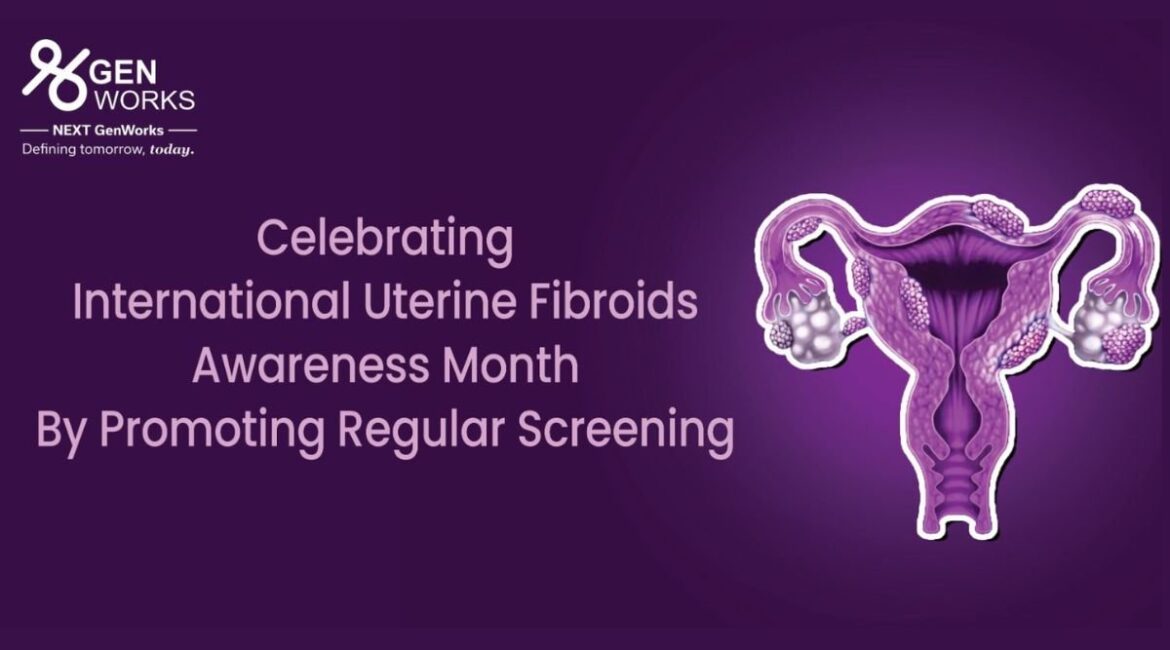New Delhi (India), July 17: In recognition of International Uterine Fibroids Awareness Month this July, GenWorks Health is leading an initiative to shed light on uterine fibroids, a condition that affects millions of women worldwide
This July, in honour of International Uterine Fibroids Awareness Month, GenWorks Health is leading an initiative to educate women about uterine fibroids. A fibroid is an extra growth within the wall of the uterus that affects millions of women worldwide and can cause a range of symptoms, from mild to severe. Uterine fibroids are a common health concern among women, affecting up to 80% of women by the age of 50. Our mission is to raise awareness about this condition, promote early screening, and highlight the latest advancements that are transforming how uterine fibroids are detected and treated.
Uterine fibroids are a common health problem among women of reproductive age. Despite their prevalence, many women remain unaware of the symptoms and potential complications associated with fibroids. Symptoms can include heavy menstrual bleeding, prolonged periods, pelvic pain, frequent urination, constipation, and complications during pregnancy and labour. According to FOGSI, the prevalence of fibroids is reported to be 37.65% in rural populations and 24% in urban populations. Fibroids can occur as a single growth or multiple growths and can develop in different parts of the uterus, including the ones mentioned below. The impact of fibroids on a woman’s quality of life can be significant, affecting not only physical health but also emotional and mental well-being. It’s imperative to increase awareness so women can recognize the symptoms early and seek medical advice promptly.
The International Uterine Fibroids Awareness Month serves as a dedicated time to educate the public, support those affected, and advocate for research and improved treatments that encourage early screening. Awareness efforts focus on dispelling myths, providing factual information, and encouraging women to prioritize their reproductive health. “Education is a powerful tool in the fight against uterine fibroids,” said Mr S GaneshPrasad, MD and CEO, GenWorks Health. “By spreading knowledge about the symptoms and importance of early diagnosis, we can empower women to take control of their health and improve their quality of life.”
Over the past few years, significant advancements have been made in the diagnostic technologies used to detect uterine fibroids. Traditional methods such as pelvic exams, ultrasounds, and MRIs have been invaluable in identifying fibroids. However, new and innovative technologies are enhancing accuracy, reducing invasiveness, and providing more comprehensive insights. One such advancement is the development of high-resolution diagnostic devices that offer real-time views of the uterus. These devices not only improve the detection of fibroids but also provide detailed information on their size, location, and impact on surrounding tissues. This detailed information is crucial for planning effective treatment strategies and improving patient outcomes.
When it comes to treating uterine fibroids, methods such as Resectoscope and Blind D&C (dilation and curettage) are traditional methods that have been used commonly. These techniques, though once common, are less precise and carry higher risks of incomplete removal and complications. A resectoscope involves visually guided removal of intrauterine pathology, however, the electrical energy generated can potentially harm the surrounding tissues. Blind D&C relies on feeling the fibroids, often resulting in partial removal and requiring multiple procedures. mHTR, in contrast, offers a more effective treatment. It is an advanced method to cut and aspirate fibroids using a mechanical tissue removal system as an effective technique for the visualisation and removal of uterine fibroids.
Hysteroscopy involves inserting a hysteroscope, a thin, lighted tube, through the vagina and cervix into the uterus. This allows the physician to directly view the uterine cavity and identify fibroids. The mechanical tissue removal system employs a motorized device with a rotating blade or morcellator to cut and remove fibroid tissue. This method is minimally invasive, reducing the need for open surgery and decreasing recovery time. The device’s precision allows for targeted removal of fibroids while preserving healthy uterine tissue. The combination of direct visualization and mechanical excision ensures thorough and efficient fibroid removal, alleviating symptoms such as heavy menstrual bleeding, pain, and pressure, and improving the patient’s quality of life.
As we celebrate International Uterine Fibroids Awareness Month, GenWorks Health urges women to prioritize their reproductive health. Recognizing the symptoms of uterine fibroids and seeking regular screenings are critical steps toward early diagnosis and effective management of the condition. Mr S GaneshPrasad, MD and CEO, GenWorks Health said “We are committed to advancing women’s health through education and innovation. By embracing new diagnostic technologies, we can make significant strides in the early detection and treatment of uterine fibroids, ultimately improving the lives of millions of women.”
About GenWorks: GenWorks is a leading healthcare solutions provider committed to enhancing healthcare access and outcomes. With a mission to improve healthcare for all, GenWorks offers a range of innovative solutions that support healthcare professionals in providing top-tier care to patients.
For more information about GenWorks and our mission to improve healthcare outcomes, please visit https://www.genworkshealth.com
Sources:https://store.genworkshealth.com/product/72204878/hysteroscope-mini-truclear
If you have any objection to this press release content, kindly contact pr.error.rectification@gmail.com to notify us. We will respond and rectify the situation in the next 24 hours.

